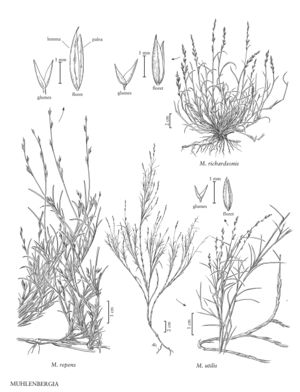Difference between revisions of "Muhlenbergia repens"
FNA>Volume Importer |
FNA>Volume Importer |
||
| Line 17: | Line 17: | ||
-->{{Treatment/Body | -->{{Treatment/Body | ||
|distribution=Utah;Ariz.;Colo.;N.Mex.;Tex. | |distribution=Utah;Ariz.;Colo.;N.Mex.;Tex. | ||
| − | |discussion=<p | + | |discussion=<p>Muhlenbergia repens grows in open, sandy meadows, canyon bottoms, calcareous rocky flats, gypsum flats, and on rolling slopes and roadsides, at elevations of 100-3120 m. Its range extends from the southwestern United States to southern Mexico.</p> |
|tables= | |tables= | ||
|references= | |references= | ||
| Line 33: | Line 33: | ||
|basionyms= | |basionyms= | ||
|family=Poaceae | |family=Poaceae | ||
| + | |illustrator=Linda A. Vorobik and Annaliese Miller | ||
|distribution=Utah;Ariz.;Colo.;N.Mex.;Tex. | |distribution=Utah;Ariz.;Colo.;N.Mex.;Tex. | ||
|reference=None | |reference=None | ||
| Line 38: | Line 39: | ||
|publication year= | |publication year= | ||
|special status= | |special status= | ||
| − | |source xml=https:// | + | |source xml=https://bibilujan@bitbucket.org/aafc-mbb/fna-data-curation.git/src/314eb390f968962f596ae85f506b4b3db8683b1b/coarse_grained_fna_xml/V25/V25_748.xml |
|subfamily=Poaceae subfam. Chloridoideae | |subfamily=Poaceae subfam. Chloridoideae | ||
|tribe=Poaceae tribe Cynodonteae | |tribe=Poaceae tribe Cynodonteae | ||
Revision as of 17:18, 30 October 2019
Plants perennial; rhizomatous, not cespitose. Culms 5-42 cm tall, 0.5-1 mm thick, decumbent near the base, forming dense mats; internodes glabrous, slightly nodulose. Sheaths shorter or longer than the internodes, glabrous; ligules 0.1-1(1.8) mm, membranous, truncate, occasionally lacerate; blades 0.4-6 cm long, 0.5-1.4 mm wide, involute, glabrous, smooth or scabridulous adaxially. Panicles 1-9 cm long, 0.1-0.6 cm wide, contracted, not dense, usually partially included in the upper leaf sheaths; primary branches 0.2-3 cm, usually closely appressed at maturity, rarely diverging up to 40° from the rachises; pedicels 0.2-3.6 mm, setulose. Spikelets 2.6-4.2 mm, occasionally with 2 florets. Glumes subequal, 1.1-3.6 mm, from 1/2 as long as to equaling the lemmas, light green, 1(2-3)-veined, acute, unawned; lemmas 2.6-3.2(4.2) mm, lanceolate, dark greenish or mottled, glabrous or the calluses and margins appressed-pubescent, hairs to 0.3 mm, apices scabridulous, attenuate, usually mucronate, mucros 0.1-0.3 mm; paleas 2.1-3.3 mm, lanceolate, smooth or scabridulous, acute; anthers 0.7-1.4 mm, yellow to purplish. Caryopses 1.1-1.5 mm, ellipsoid to ovoid, brownish. 2n = 60, 70-72.
Distribution
Utah, Ariz., Colo., N.Mex., Tex.
Discussion
Muhlenbergia repens grows in open, sandy meadows, canyon bottoms, calcareous rocky flats, gypsum flats, and on rolling slopes and roadsides, at elevations of 100-3120 m. Its range extends from the southwestern United States to southern Mexico.
Selected References
None.
